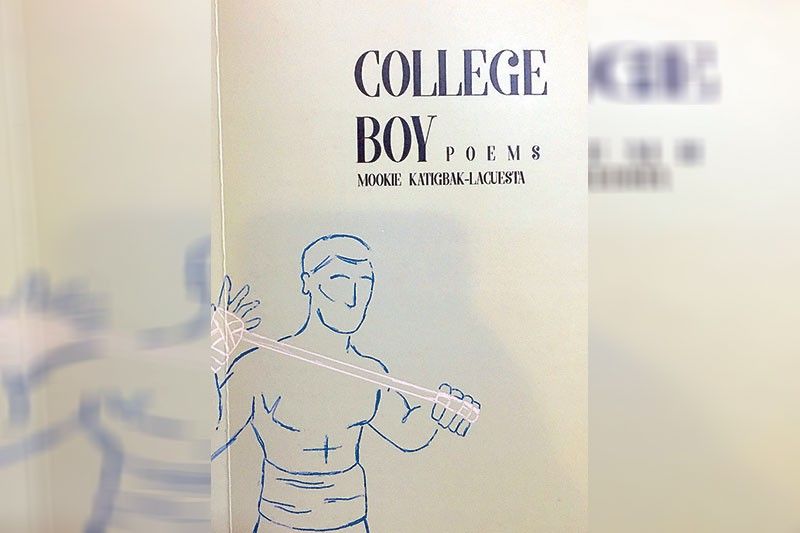On the brink of the indelicate


There’s a carnival and a circus and a cavalcade of ways to review a book of poems. One is to hold up previous produce as various yardsticks, the backstory to trace progress or current retrograde. Another is to pay no mind to history and chronology of crafting.
Here’s another: alighting upon the utterance that would mark a drumbeat in the breast. Among all the perils of glossolalia are dragon-glass blades that strike at the ghostly desire for infinity.
In Mookie Katigbak-Lacuesta’s fifth collection, College Boy (Ateneo de Manla University Press’ BUGHAW imprint), here’s the final part of the poem “Self-Portrait with Bandaged Ear”:
“… It must have hurt/ to know all the crickets of Arles / Would hereon remain anonymous. // That Rachel, the ruined girl / You loved, couldn’t tell you / A single word that could have saved you. // Had she screamed into your ear, / Gossamer would have garbled / The word. And if you’d heard, // You’d ambled down a hole so deep, / Love was a predatory bird.”
Repeat: “Gossamer would have garbled/ The word.”
The line would have served up remarkable eloquence in any poem. But here the reader is first gifted the context of a “Bandaged Ear” — so the tune instantly plays in the head, about Vincent who was starry-starry-knighted and painted self-portraits.
Delicate webs spun by spiders would then have turned substantial enough to garble a word, especially “the” Word. And what would that word be, whether screamed or whispered by Rachel in a noisy brothel? Love? Or the cost of its simulation?
Whichever. If the vestigial ear had jumped for the catch, and heard yellow ochre, the garbling might have led to ambling, by a tin man with tin ear down the rabbit hole at the end of the yellow ochre road, in which depth was the L word of a rara avis de rapiña.
Here’s how the lightsaber touch of poetry can transport anyone through portals of perception, imagination, recognition — of the marvels of the metaphor on trampoline, rising above carousels of stanzas, up in the starry night, vying with a Ferris wheel of imagery. Why, one can even partner as trapeze artist with the poet.
And that’s just one prize won at party hour with a book.
For now, since scant time remains for scholarship, there’s no need to even puzzle at the private codes (let alone try to decipher them) that some poets design and construct within a particular collection. Seems simpler to grant that it’s Katigbak-Lacuesta’s privilege to essay this, conduct duels with privacy, as she does with the way she groups the poems thematically, into four parts (Lakambini, Kartilya, Silang, and Bright Girls, before Epilogue) and scatter “Turo” variations that are numbered hopscotch within the first two groups.
But I couldn’t resist the lure of a spoor, so I followed the GPS for piko a la poesie, fancying an invite to dance sideways, here, there and everywhere, with peripheral ears intact. What seem to be arbitrarily placed numbers of the “Turo” variations unravel a parade of aphorisms, of which I abide most with “Turo (3)”:
“Holy are / the charitable; / holy are they / who love the other; holy are they / who measure / deed and word / by how true they are, / and good.”
When the poet invokes “Turo,” of course she points the way. To a merry chase, possibly. And that’s another function of a poetry selection, or poetry in general, or of a particular poem. The mazes of reality thus turn into sources of amusement. Good game. Wonderful play. Brava, homo ludens.
Prizes galore, indeed. Especially when the poet’s persona pries open her POV of the premier past.
The poem “We all have one of them” is a fascinating narrative. “Twelve years old, and / already killing stars, / Barring the knob / With a chair.”
“What do we do with the body?” is rhetoric of blank verse as echoes. “Who gets to kiss the bloodied lock of hair / askew on the forehead, who gets to close the eyes?”
“Shame” is a court pleading that borders on petulance. “I was born to dodge a kiss, slap an arm, keep from dives // past a certain hour. // I didn’t know love, / but I knew survival.”
“Chinoiserie” joins these longer poems, as another selective chronicle of the pubescent as prey. “Because he does not know / your name, he is calling // after you in his / native tongue.”
Intriguing fragments of story arcs invariably trail off into ellipses, suggesting crevasses of charted memory to be leapt over time and again. Similarly, images and invocations of favored words (love, mother, father, family, boys …) pepper the landscape as endearing lingo of incompletion. It is as consensual as a 12-year-old apprentice can get, venturesome as she may be in ascertaining the edges of brinkwomanship.
The title poem affirms this faith in having to depart early or late from what can only be tentative. Indelicate is likely the way in the big tent of survival.
“For all his talk, / he chose the girl // her father broke / with words, whose bones // he could whittle down / a little at a time. // The girl hunched over / by such unlove, // she was the one.”



















